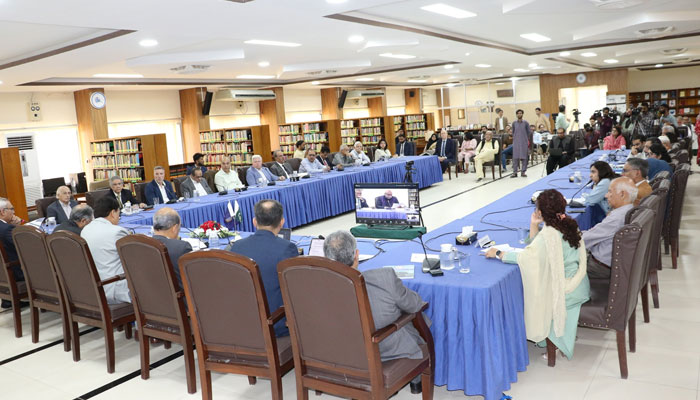Importance of Indian Ocean in maritime trade highlighted
Islamabad: Vice Admiral Ahmed Saeed, President, NIMA, has said that the Indian Ocean was crucial for global maritime trade with around 80 percent of global oil trade passing through its chokepoints.
Admiral Khan was giving keynote address at a seminar on “India’s maritime buildup: Implications for the Indian Ocean” hosted here by Institute of Strategic Studies (ISS) in collaboration with Indian Ocean Study Centre (IOSC), National Institute of Maritime Affairs (NIMA).
Admiral Khan stressed that regional cooperation and dialogue are needed to mitigate tensions and promote stability. Vice Admiral (r) Khan Hasham Bin Saddique elaborated on the great power competition in the region. He underscored the nontraditional challenges including piracy, terrorism and human trafficking which complicate the already tense maritime security landscape.
Brig Zahir Kazmi, Director General, Arms Control and Disarmament Affairs, Strategic Planning Division, shared his insights on the Indian sea-based nuclear capabilities and their impact on deterrence stability. He elaborated on how India was expanding its nuclear weapons capabilities at sea and how it could undermine regional deterrence and could potentially lead to an arms race increasing conflict risk.
Baber Bilal Haider, Vice President NIMA, explored India’s maritime ambitions and emphasised on India’s strategic culture which was influenced by historical and ideological factors and drives its current politics. His analysis extended beyond security concerns to include regional stability and economic cooperation.
Rear Admiral (r) Syed Faisal Ali Shah emphasised the strategic importance of Gwadar port and its potential to transform regional trade dynamics while also addressing the security threats posed by India’s naval buildup. He stressed according due cognizance to the importance of maritime domain and shifting the strategic focus accordingly.
Earlier, Sohail Mahmood, DG, ISS, in his welcome remarks, stated that the Indian Ocean plays a critical role as a vital maritime corridor, connecting nations across Africa, Asia and Australia and highlighted its immense geopolitical significance on a global scale. He also elaborated on the Indian Ocean’s role as a crucial arena for diplomatic engagement and regional collaboration. He pointed out that controlling the Indian Ocean often equates with dominance over Asia, emphasising its pivotal role in shaping regional dynamics.
-
 Pentagon Threatens To Cut Ties With Anthropic Over AI Safeguards Dispute
Pentagon Threatens To Cut Ties With Anthropic Over AI Safeguards Dispute -
 Meghan Markle's Father Shares Fresh Health Update
Meghan Markle's Father Shares Fresh Health Update -
 Travis Kelce Takes Hilarious Jab At Taylor Swift In Valentine’s Day Post
Travis Kelce Takes Hilarious Jab At Taylor Swift In Valentine’s Day Post -
 NASA Confirms Arrival Of SpaceX Crew-12 Astronauts At The International Space Station
NASA Confirms Arrival Of SpaceX Crew-12 Astronauts At The International Space Station -
 Can AI Bully Humans? Bot Publicly Criticises Engineer After Code Rejection
Can AI Bully Humans? Bot Publicly Criticises Engineer After Code Rejection -
 Search For Savannah Guthrie’s Abducted Mom Enters Unthinkable Phase
Search For Savannah Guthrie’s Abducted Mom Enters Unthinkable Phase -
 Imagine Dragons Star, Dan Reynolds Recalls 'frustrating' Diagnosis
Imagine Dragons Star, Dan Reynolds Recalls 'frustrating' Diagnosis -
 Steve Jobs Once Called Google Over Single Shade Of Yellow: Here’s Why
Steve Jobs Once Called Google Over Single Shade Of Yellow: Here’s Why -
 Barack Obama Addresses UFO Mystery: Aliens Are ‘real’ But Debunks Area 51 Conspiracy Theories
Barack Obama Addresses UFO Mystery: Aliens Are ‘real’ But Debunks Area 51 Conspiracy Theories -
 Selma Blair Explains Why Multiple Sclerosis 'isn't So Scary'
Selma Blair Explains Why Multiple Sclerosis 'isn't So Scary' -
 Will Smith Surprises Wife Jada Pinkett With Unusual Gift On Valentine's Day
Will Smith Surprises Wife Jada Pinkett With Unusual Gift On Valentine's Day -
 Shamed Andrew Has Paid Royal Favours With ‘national Scandal’
Shamed Andrew Has Paid Royal Favours With ‘national Scandal’ -
 Prince William Ticked Off By How Andrew ‘behaved With Staff’
Prince William Ticked Off By How Andrew ‘behaved With Staff’ -
 Prince William Questions Himself ‘what’s The Point’ After Saudi Trip
Prince William Questions Himself ‘what’s The Point’ After Saudi Trip -
 James Van Der Beek's Friends Helped Fund Ranch Purchase Before His Death At 48
James Van Der Beek's Friends Helped Fund Ranch Purchase Before His Death At 48 -
 King Charles ‘very Much’ Wants Andrew To Testify At US Congress
King Charles ‘very Much’ Wants Andrew To Testify At US Congress




